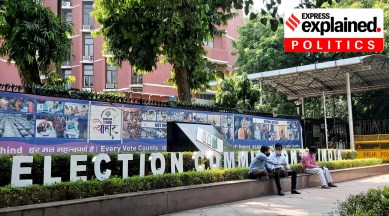With Supreme Court order on EC appointments, a history of futile Opp dissent on picks for top posts
Similar high-power panels already pick heads such as the CBI Director, Central Vigilance Commissioner (CVC), and NHRC chairperson. The choices have almost always been dictated by the government, ignoring Opposition objections.

The Supreme Court on March 2 gave a say to the Opposition in the selection of the Chief Election Commissioner and Election Commissioners, ruling that these officials would be appointed by the President based on the recommendation of a committee comprising the Prime Minister, Leader of Opposition in Lok Sabha, and Chief Justice of India (CJI).
Similar high-power panels already pick the CBI Director, Central Vigilance Commissioner (CVC) and Vigilance Commissioners, NHRC chairperson, Chief Information Commissioner (CIC) and Information Commissioners, Chairperson and members of Lokpal. The choices have almost always been dictated by the government, ignoring Opposition objections.
CBI Director
*In January 2017, the government and Opposition faced off over the appointment of then Delhi Police Commissioner Alok Kumar Verma as CBI Director. In a meeting chaired by PM Narendra Modi, Congress president Mallikarjun Kharge, who was his party’s leader in Lok Sabha at the time, objected to Verma’s selection citing his lack of experience in the CBI.
*Kharge recorded his dissent in writing, but Verma was still appointed to the position, in which he served until January 2019.
*In October 2018, after the government sent Verma and his deputy Rakesh Asthana — who were at loggerheads then — on leave and made M Nageshwar Rao interim Director, Kharge wrote to the PM arguing that the move was “illegal” as “no one — neither you nor the CVC — enjoys the…authority to interfere with the Terms of Service vested in the Director”. He said that the DSPE Act gave the Director a two-year tenure, and he “shall not be transferred except with the previous consent of the Committee” [that selected him].
*In January 2019, the SC reinstated Verma — but two days later, the PM-headed high-power committee removed him on charges of corruption and dereliction of duty by a 2:1 decision. Kharge objected again; the third member, Justice A K Sikri (standing in for then CJI Ranjan Gogoi), took a position against Verma based on an unfavourable report by the CVC, given on a complaint by Asthana.
*A month later, Kharge again dissented when the government chose Rishi Kumar Shukla as the new Director, saying the selection criteria had been diluted in violation of the law and Supreme Court judgments.
*In May 2021, Kharge’s successor as Congress leader in Lok Sabha Adhir Ranjan Chowdhury dissented at the high-power meeting to pick the CBI chief. Chowdhury objected to the Department of Personnel and Training pruning — on its own — the original list of 109 names sent to the panel to just 16.
The CVC and CIC
The Central Vigilance Commission Act, 2003, states the CVC and Vigilance Commissioners shall be appointed on the recommendation of a panel of the PM, Home Minister, and Leader of Opposition in Lok Sabha.
The Right to Information Act, 2005, states that CIC and Information Commissioners shall be appointed by the President on the recommendation of a committee consisting of the PM, Lok Sabha Leader of Opposition, and a Union Cabinet Minister nominated by the PM.
*In February 2020, the government overrode Chowdhury’s dissent to choose Sanjay Kothari as CVC and Bimal Julka as CIC. Chowdhury pointed to “glaring and fatal infirmities with the (search) committee itself” — a member, Rajiv Kumar, “also turned out to be an applicant for the CVC and was finally shortlisted for the post…by the search committee”.
On appointment of the CIC, Chowdhury said the government had reduced the process to “an empty paper formality” by not providing any material particulars for the selection.
*In October 2020, Chowdhury strongly objected to the appointments of Information Commissioner Yashvardhan Kumar Sinha as the new CIC and journalist Uday Mahurkar as Information Commissioner.
NHRC chief, members
The Protection of Human Rights Act, 1993, states that the chairperson and members shall be appointed by the President on the recommendation of a Committee consisting of the PM, Lok Sabha Speaker, Home Minister, Leaders of Opposition in Lok Sabha and Rajya Sabha, and Deputy Chairman of Rajya Sabha.
In June 2021, Kharge, Leader of Opposition in Rajya Sabha, objected to the appointment of Justice Arun Mishra as NHRC chief, instead seeking a member of the SCs or STs in the post.
Controversy under UPA
In September 2010, the late Sushma Swaraj, then Leader of Opposition in Lok Sabha, recorded her dissent to the appointment of then Telecom Secretary P J Thomas as CVC, who was favoured by then Prime Minister Manmohan Singh and then Home Minister P Chidambaram. In March 2011, in a major embarrassment to the UPA government, the Supreme Court struck down Thomas’s appointment.